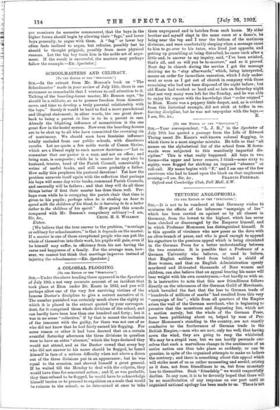A COLOSSAL FLOGGING.
[To THE EDITOR OP THE "SPECTATOR.") SIR,—Under the above heading there appeared in the Spectator of July 19th a not very accurate account of an incident that took place at Eton under Dr. Keate in 1832, and you will perhaps allow one of the very few surviving victims of the famous Doctor's discipline to give a correct narrative of it.. The number punished was certainly much above the eighty at which it is placed in the extract quoted by your correspon- dent, for it comprised three whole divisions of the school, and can hardly have been less than one hundred and forty; but it was in no sense " collective," if by that is meant the inclusion of the innocent with the guilty, for there was not one of us who did not know that he had fairly earned his flogging. For some reason or other it had been decreed that on a certain eventful Saturday afternoon the three divisions in question were to have an extra "absence," which the boys declared they would not attend, and as the Doctor vowed that every boy who did not answer to his name should be flogged, he found himself in face of a serious difficulty when not above a dozen out of the three divisions put in an appearance ; but he was equal to the occasion, and showed himself a great general. If he waited till the Monday to deal with the culprits, they would have time for concerted action ; and if, as was probable, they then refused to be flogged, he would have to acknowledge himself beaten or to proceed to expulsion on a scale that would be ruinous to the school; so he determined at once to take
them unprepared and in batches from each house. My elder brother and myself slept in the same room at a dame's, he being near the top and I near the bottom of the mutinous divisions, and were comfortably sleeping when a message came to him to go over to his tutor, who lived just opposite, and getting up grumbling at being disturbed, he came back after a little and, in answer to my inquiry, said, "I've been swished, that's all, and so will you be to-morrow," and so it proved. Next day in church during the service I got the message desiring me to " stay afterwards," which, being interpreted, means an order for immediate execution, which I duly under- went as soon as I got out of church in company with those remaining who had not been disposed of the night before ; but old Keate had worked so hard and so late on Saturday night that not very many were left for the Sunday, and he was able to enjoy his repose with the knowledge that " order reigned" in Eton. Keate was a peppery little despot, and, as is evident from this historical example, did not stick at trifles in en- forcing discipline, but he was not unpopular with the boys.--






































 Previous page
Previous page